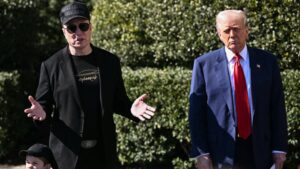The Economic Implications of Musk’s Opposition to Federal Spending
At Extreme Investor Network, we delve into topics that shape the economy, providing unique insights and deeper analysis. Recently, a high-profile debate emerged between Tesla CEO Elon Musk and U.S. Republicans over a significant spending bill, making headlines for its economic ramifications. Here’s what you need to know.
Musk’s Push for Fiscal Responsibility
In a recent interview set to air on "CBS Sunday Morning," Musk, alongside former President Donald Trump, expressed his disappointment regarding a massive spending bill passed by the House. Musk, who heads the Department of Government Efficiency (DOGE), argued that the bill would increase the federal budget deficit rather than mitigate it. He stated, "I was disappointed to see the massive spending bill, frankly, which increases the budget deficit, not just decrease it."
The Impact of DOGE
Under Musk’s leadership, DOGE has reportedly saved taxpayers $170 billion by targeting government waste and inefficiencies. The agency adopted unconventional methods, resulting in around 275,000 government layoffs and significant cuts in various sectors, including the U.S. Agency for International Development (USAID). This approach to streamlining government operations has sparked both support and controversy, underscoring the complexities of fiscal reform.
The Big Picture: The Spending Bill’s Consequences
The "One Big Beautiful Bill Act" is projected to raise the federal budget deficit by $3.8 trillion over the next decade, as reported by the Congressional Budget Office. With the national debt already surpassing $36 trillion and projected deficits nearing $2 trillion annually, this legislation raises critical questions about the future of fiscal policy in the U.S. and the potential long-term impacts on economic stability.
Musk’s critical perspective resonates with many who advocate for a more responsible and lean government, emphasizing that spending should promote growth rather than curtail fiscal health. “I think a bill can be big or it could be beautiful, but I don’t know if it could be both,” Musk remarked, encapsulating the dilemma facing lawmakers.
A Clash of Economic Visions
The debate intensifies as Republicans, including Trump, argue that this spending will foster economic growth and limit cuts in vital areas. They suggest that the bill is designed to create a balanced approach, despite Musk’s bold claims that it undermines attempts at fiscal responsibility.
On the other hand, Musk’s shifting focus raises another dimension to this discourse. He stated, “I plan to focus on running my companies,” stepping back from the minutiae of government efficiency programs. This move hints at a broader sentiment where business leaders must navigate an increasingly complex regulatory landscape.
Insights from Extreme Investor Network
At Extreme Investor Network, we encourage our readers to dig deeper into economic debates like this one. The juxtaposition of Musk’s initiatives and the Republican spending bill raises critical questions about the future trajectory of U.S. fiscal policy. As the nation grapples with soaring debt, our commitment to exploring these themes is essential for understanding the broader economic implications.
Stay tuned for further analysis and insights as this story unfolds, and join us as we explore the intersection of finance, government, and innovation—issues that ultimately affect every investor and citizen in the country.

